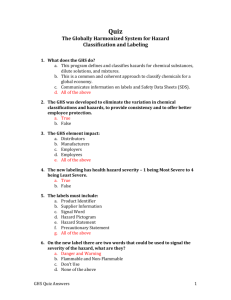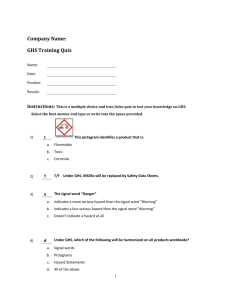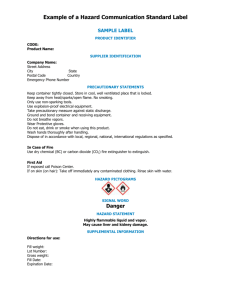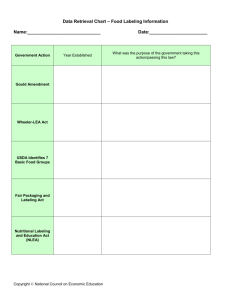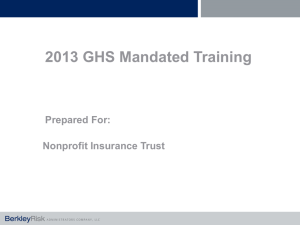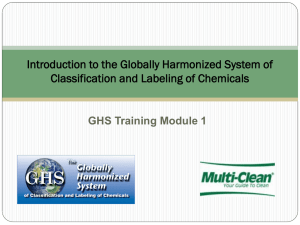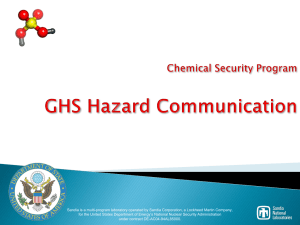Your Right to Know
advertisement
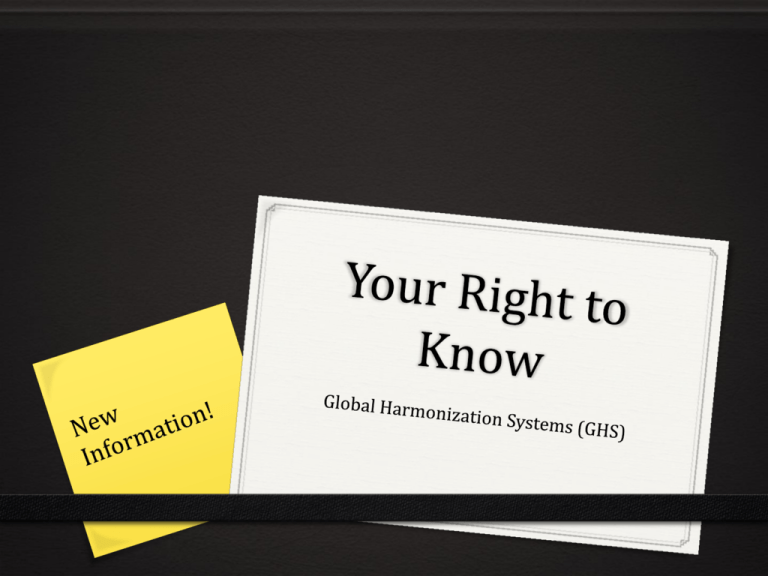
Your Right to Know: Global Harmonization System 0 What is it? 0 Why do I need to know about GHS? 0 What are the changes? 0 What if I have questions? GHS – What is it? 0 The Global Harmonization Standard (GHS) is an international agreement among nations to use a common classification and labeling system for chemicals 0 New Labels will be on products 0 Online information about chemicals will become consistent 0 GHS is part of OSHA’s Hazard Communication Standard (HCS) Law. Why do I need to Know? 0 Chemicals are located throughout every building of the College 0 One of your rights as an employee is to know what chemicals –including cleaning supplies – are being used the in the buildings where you work. What are the Changes? 0 New labeling system 0 New product information sheets Hazard Communication Safety Data Sheets Changes: Labeling System 0 All labels on chemical containers will have the same information. 0 The key components are: 0 Product Identifier 0 Pictogram 0 Signal Word 0 Hazard Statement 0 Precautionary Statement(s) Changes: Labeling System – What is a “Pictogram?” 0 Picture-based communication, similar in concept to traffic signs 0 Each pictogram consists of a diamond shaped symbol, with a white background and a red border Changes: Labeling Pictograms Health Hazard • Carcinogen • Toxicity • Respiratory Sensitizer Exclamation Mark • Irritant Skull & Crossbones • Acute Toxicity Changes: Labeling Pictograms Flame • Flammables • Pyrophorics • Organic Peroxides Flame over Circle • Oxidizers Corrosives • Skin burns • Eye damage • Corrosive to metals Changes: Labeling Pictograms Gas Cylinder • Gases under pressure Bomb Exploding • Explosives Environmental Hazard • Aquatic toxicity Changes: Labeling System – Signal Word 0 A signal word is a single word that indicates the severity level of the hazard. 0 The new system has two signal words: 0 Danger – more severe hazards 0 Warning – less severe hazards Changes: Labeling System – Hazard Statement 0 Describes the nature of the chemical hazard, and sometimes includes the degree (i.e., “highly flammable liquid” instead of “flammable liquid”) Changes: Labeling System – Precautionary Statements 0 Precautionary Statements describe recommended measures that should be taken to minimize or prevent adverse effects. First aid: IF ON SKIN (or hair) or clothing: Rinse immediately contaminated clothing and skin with plenty of water before removing clothes. Wash contaminated clothing before reuse. IF IN EYES: Rinse cautiously with water for several minutes. Remove contact lenses, if present and easy to do. Continue rinsing. IF INHALED: Remove person to fresh air and keep comfortable for breathing. IF SWALLOWED: Rinse mouth. Do NOT induce vomiting. Immediately call poison center. Specific Treatment: Treat with doctor-prescribed burn cream. Changes: Safety Data Sheets 0 Under the current system, the Material Safety Data Sheets (MSDS) contain the important information, but manufacturers use different formats so it can be difficult to find the information you need quickly in an emergency. Changes: Safety Data Sheets 0 The GHS Safety Data Sheets (SDS) are standardized. The data sheets list the important information about each chemical: 0 by section 0 in the same order 0 using standardized language 0 no matter which country created the chemical Changes: Safety Data Sheets 0 There are 16 sections – 0 Sections 1-5 state the same types of information found on the labels of chemical containers 0 Sections 6 -8 contain safe handling and storage types of information 0 Sections 9-16 are the more technical information about the chemical SDS Library Access 0 The College’s SDS library can be accessed through the William and Mary website by searching for “Safety Data Sheets” 0 The first search result will take you to the College’s SDS website 0 The electronic library link is contained on this page. 0 Your College username and password will allow you access. 0 Once in the system you can search by chemical name, manufacturer, or building and room. WAIT! There is an easier Way! 0 EHS has a QR Code What if I have Questions? 0 Contact the Office of Environment, Health & Safety http://www.wm.edu/offices/facilities/services/safety/index.php phone: 221-2146 0 Watch this video: http://www.youtube.com/watch?v=vCI7XXExs7s PROPERTIES On passing, 'Finish' button: On failing, 'Finish' button: Allow user to leave quiz: User may view slides after quiz: User may attempt quiz: Goes to Next Slide Goes to Next Slide After user has completed quiz At any time Unlimited times
